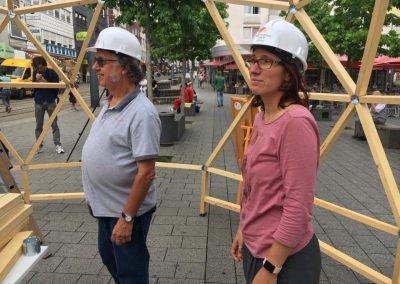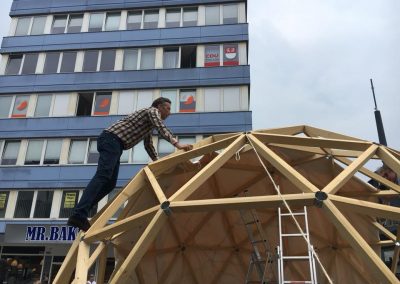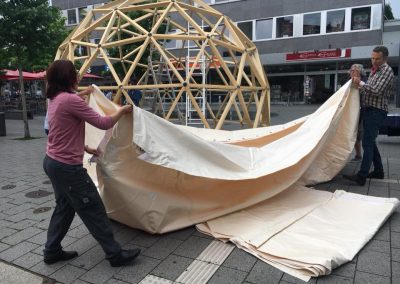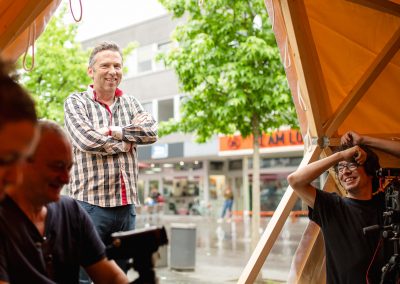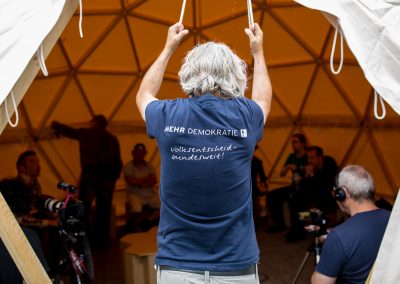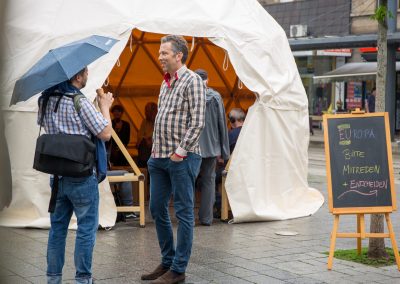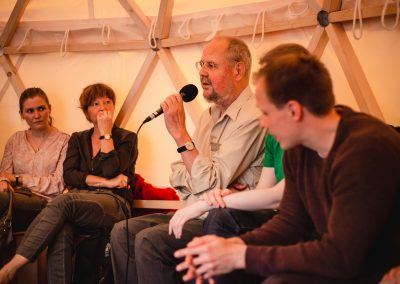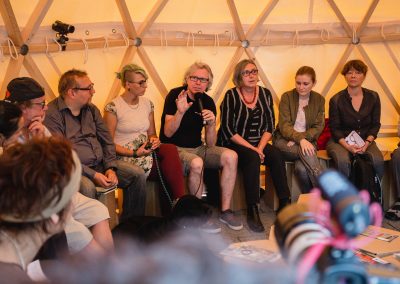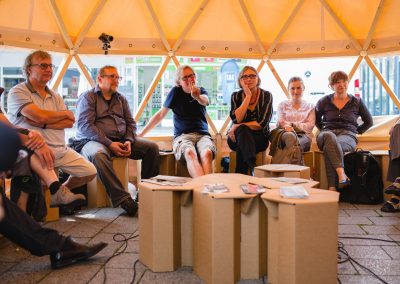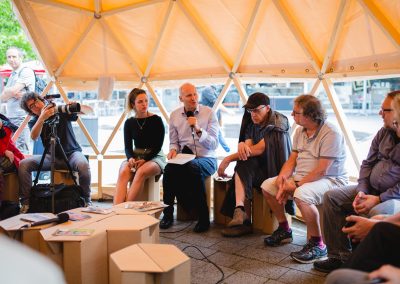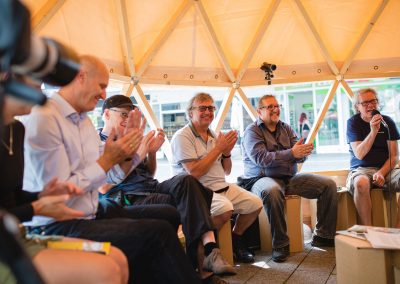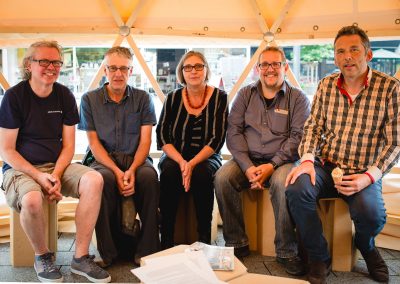Rethinking Social Justice in Europe
Witten, Germany | Last Friday, the fifth Dome Talk of the North Rhine-Westphalia Tour took place in Witten, Germany, organized by Mehr Demokratie within the framework of the European Public Sphere Project. The topic “Rethinking Social Justice in Europe” was chosen in connection with the EU Conference Witten 2018, which took place on the same weekend in the rooms of the University of Witten/Herdecke. Gerhard Schuster was under the dome and summarizes his impressions.
After I had taken part in the first two Dome Talks of the NRW Tour in Bonn and Münster, I was happy that it would work out again in Witten.
In the days before we were already worried about the weather. There were strong thunderstorms and more thunderstorms predicted. But nothing too bad happened, we could finish the construction of the dome mostly in the dry and then had our rain protection premiere, which we pulled over our dome, “So that Europe doesn’t get wet”, as Jörg Eichenauer stated during the welcome greeting.
The guests were numerous: Nikolai Fuchs from GLS Treuhand, Brigitte Krenkers from Omnibus für Direkte Demokratie, Sören Bärsch and Simon Gutleben from Junge Europäische Föderalisten, Birgit Weinbrenner from Institut für Kirche und Gesellschaft, Tom Tritschel, pastor of the Christian Community in Bochum, Alfred Groff from Luxembourg, who has already participated in the construction and will accompany the dome on some occasions in the future. There were also some people who had heard about the Dome Talk or just came by.
The topic was – in coordination with a conference that took place that weekend in Witten – “Rethinking Social Justice in Europe”: How does the question of social justice relate to the fact that people keep turning away from Europe? – Can the importance of regions in Europe be upgraded in a way that regional sovereignty can lead to better economic standards altogether? How can the state, still fulfill the common good tasks at all if the tax revenues in the global competition for better economic standards become smaller? These were some of the questions raised under the dome.
In the days before we were already worried about the weather. There were strong thunderstorms and more thunderstorms predicted. But nothing too bad happened, we could finish the construction of the dome mostly in the dry and then had our rain protection premiere, which we pulled over our dome, “So that Europe doesn’t get wet”, as Jörg Eichenauer stated during the welcome greeting.
The guests were numerous: Nikolai Fuchs from GLS Treuhand, Brigitte Krenkers from Omnibus für Direkte Demokratie, Sören Bärsch and Simon Gutleben from Junge Europäische Föderalisten, Birgit Weinbrenner from Institut für Kirche und Gesellschaft, Tom Tritschel, pastor of the Christian Community in Bochum, Alfred Groff from Luxembourg, who has already participated in the construction and will accompany the dome on some occasions in the future. There were also some people who had heard about the Dome Talk or just came by.
The topic was – in coordination with a conference that took place that weekend in Witten – “Rethinking Social Justice in Europe”: How does the question of social justice relate to the fact that people keep turning away from Europe? – Can the importance of regions in Europe be upgraded in a way that regional sovereignty can lead to better economic standards altogether? How can the state, still fulfill the common good tasks at all if the tax revenues in the global competition for better economic standards become smaller? These were some of the questions raised under the dome.
Video from our Dome Talk in Witten on 8 June 2018
“It is said that so much nonsense happens. I would be very much in favour of discussing as much nonsense as possible. And that’s what’s happening in Switzerland. It’s about the question of how I create awareness. The referendum in Switzerland is an institution that makes it possible, for example, to raise the question: What is money actually? In this way, these things can be discussed and dealt with in public on a large scale”.
I want to go into detail on the latter, because why do we think “the social” and “the economy” as opposites at all? Is economy – elementary and beyond ideologies – not per se the social functional system that has the task of satisfying the needs of all people in a way that is oriented towards the common good and ecology? By assigning social tasks to the state, the opposition “private” vs. “state” seems natural and the private profit motive sacrosanct. But we can also think of the economy beyond this contradiction in a “public-law” character, in which free economic initiative is given, but the profit serves public welfare tasks and the safeguarding of fair incomes. Such an economic sector would have to be financed by a serving banking system, as the European Credit Initiative is trying to bring into the discussion with its European Citizens’ Initiative.
As far as the question of a fair income is concerned, the idea of an unconditional basic income was also raised in Witten. Why do we always think of securing ‘work’ , Tom Tritschel asked, and why should it not be quite right to have ‘jobs’ taken over by robots wherever possible?
Share this post:
People are not dependent on having a job, they need an income in order to being able at all to participate in fulfilling the tasks that arise in our society. Work and income must be seen as separate things. In Switzerland, through direct democracy – which was once again one of the central themes under the Witten dome – an issue such as a basic income can be discussed much more starkly. It is possible that something utopian, which one often still considers quite impossible due to thinking habits, is brought into play.
However, these topics – taxes and competition between locations, state and economy, work and income or the strengthening of representative or direct democracy – were not discussed uncritically. For the Young European Federalists, for example, the focus is on strengthening the European Parliament through a two-chamber system. Or it was thought more obvious to focus on combating tax evasion and the shadow economy. That securing jobs was not important was also not left unchallenged. There is still a need for agreement on how things are viewed differently from different perspectives and how problems can be solved with varying approaches. The European Public Sphere Dome Talks want to serve as such an encounter of thoughts!
Within the lively discussion, Nikolai Fuchs came to the conclusion that the very elementary questions were actually being dealt with here and that Europe was not the issue in the narrower sense.
But precisely because the process of European integration, the shaping of this community sui generis has not yet been completed, and because it is becoming apparent that the question of a constitution for Europe will soon be dealt with again, this is not a contradiction. On our planet, Europe is the region in which the elementary questions of social organisation are raised. Europe has the opportunity to break new ground in the challenges it faces.
Is Europe only about being able to assert oneself between East and West, between the economic powers of America and Asia, or can it also be about putting something on the agenda in Europe that also sets steps in the direction of global solidarity?
So far the discussions under our dome have been so rich and lively that I hope we will soon have the opportunity to offer the complete talks as a recording in addition to the short cuts. Perhaps we will start with the Witten discussion. Whether all of this succeeds also depends on how much support our project receives.
Is Europe only about being able to assert oneself between East and West, between the economic powers of America and Asia, or can it also be about putting something on the agenda in Europe that also sets steps in the direction of global solidarity?
So far the discussions under our dome have been so rich and lively that I hope we will soon have the opportunity to offer the complete talks as a recording in addition to the short cuts. Perhaps we will start with the Witten discussion. Whether all of this succeeds also depends on how much support our project receives.

